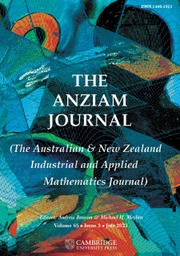Crossref Citations
This article has been cited by the following publications. This list is generated based on data provided by Crossref.
Liu, Yuji
Yang, Pinghua
and
Ge, Weigao
2005.
Periodic solutions of higher-order delay differential equations.
Nonlinear Analysis: Theory, Methods & Applications,
Vol. 63,
Issue. 1,
p.
136.

